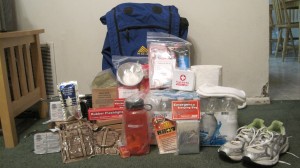 Power outages can affect anyone, whether you’re living in a college dorm, in an off-campus apartment, or at home. I found this article that talked about a recent power outage on the campus of Texas Christian University (TCU). Luckily, the power was restored a short time later, but what if it wasn’t? For example, what if Provo’s (or whatever city you’re in) power went out for a few days to weeks? Now that it’s cold outside what would you do? I would definitely make sure I had a working flashlight with extra batteries.
Power outages can affect anyone, whether you’re living in a college dorm, in an off-campus apartment, or at home. I found this article that talked about a recent power outage on the campus of Texas Christian University (TCU). Luckily, the power was restored a short time later, but what if it wasn’t? For example, what if Provo’s (or whatever city you’re in) power went out for a few days to weeks? Now that it’s cold outside what would you do? I would definitely make sure I had a working flashlight with extra batteries.
Power outages can be caused by a variety of events, major causes of power outages in the U.S. include weather-related events, animals contacting wires, auto accidents, utility maintenance, human error, and events that are unknown. Power outages can be hazardous, especially during the cold winter months and hot summer months when temperatures can become dangerously low or high. A lot of college students don’t really think about preparing for power outages so here are some safety tips you can follow:
Prepare for an approaching storm
- Keep the following items on hand:
- Fresh batteries
- A portable radio
- Flashlights
- A manual can opener
- Matches
- A battery-operated or wind-up clock
- Non-perishable food (canned and dried food)
- Make a list of emergency phone numbers and keep a personal telephone book and one corded phone or cell phone on hand.
- Keep a first-aid kit in your home and one in your car.
- Keep one gallon of bottled water available for each person in the household for each anticipated day without electric service.
- Keep cash on hand.
Protect Your Appliances and Electronic Equipment
Many home electronics are very sensitive and can be damaged during a power outage. Here are some precautions you can take to protect sensitive equipment:
- Purchase equipment with built-in surge protection or a battery-powered back-up system.
- Use electrical surge suppressors or arresters on your electronic equipment on properly grounded circuits. Most are designed to be plugged into a wall outlet.
- Plug your computers and other sensitive equipment into a separate, grounded circuit to isolate them from fluctuations caused by major appliance restarts.
- Consider having a lightning arrester installed at your main circuit panel.
- If you own a business, or have a home office, you might consider installing an uninterruptible power supply for temporary backup power for your electronic equipment.
- During a power outage, turn off all appliances, including your furnace, air conditioner, and water heater to avoid overloading circuits when power is restored to all appliances at once. Leave one lamp on so you will know when your service is restored
Check out this site for more safety tips, including how to protect your food in a power outage and how to prepare for both winter and summer power outages. Have any of you had problems with power outages while in college?






 My parents are big planners, so growing up our home was filled with food storage and other emergency supplies. My nightstand was made out of boxes of food and there were cans of wheat in my closet. I think other students at my university have had similar experiences… I knew preparedness was important, but living on my own in college has really taught me how important emergency preparedness really is. Not only does emergency preparedness refer to preparation for natural disasters, but it also includes preparation for emergencies such as power outages, injuries, financial problems, etc. I will cover these topics in my blog! You never know what life is going to throw at you or what kind of emergencies you might face, but being prepared for such emergencies can save time, money, and even your life.
My parents are big planners, so growing up our home was filled with food storage and other emergency supplies. My nightstand was made out of boxes of food and there were cans of wheat in my closet. I think other students at my university have had similar experiences… I knew preparedness was important, but living on my own in college has really taught me how important emergency preparedness really is. Not only does emergency preparedness refer to preparation for natural disasters, but it also includes preparation for emergencies such as power outages, injuries, financial problems, etc. I will cover these topics in my blog! You never know what life is going to throw at you or what kind of emergencies you might face, but being prepared for such emergencies can save time, money, and even your life.